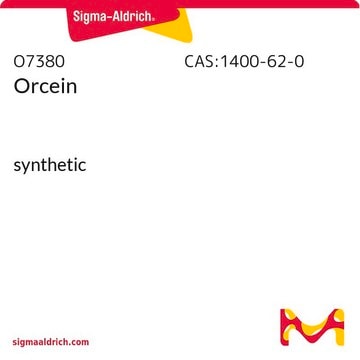229253
Carminic acid
≥90% (HPLC)
Synonym(s):
Natural Red 4
About This Item
Recommended Products
Quality Level
Assay
≥90% (HPLC)
form
powder
optical activity
[α]20/D +3.1°, c = 1 in H2O
color
purple to red-purple
red to very dark red
mp
136 °C
solubility
1 N acetic acid: 1%, clear to hazy, red
λmax
495 nm
ε (extinction coefficient)
≥13000 at 222-228 nm in ethanol at 0.03 g/L
≥18000 at 275-281 nm in ethanol at 0.03 g/L
application(s)
diagnostic assay manufacturing
hematology
histology
storage temp.
room temp
SMILES string
Cc1c(C(O)=O)c(O)cc2C(=O)c3c(O)c(O)c([C@@H]4O[C@H](CO)[C@@H](O)[C@H](O)[C@H]4O)c(O)c3C(=O)c12
InChI
1S/C22H20O13/c1-4-8-5(2-6(24)9(4)22(33)34)13(25)10-11(15(8)27)16(28)12(18(30)17(10)29)21-20(32)19(31)14(26)7(3-23)35-21/h2,7,14,19-21,23-24,26,28-32H,3H2,1H3,(H,33,34)/t7-,14-,19+,20-,21+/m1/s1
InChI key
DGQLVPJVXFOQEV-JNVSTXMASA-N
Looking for similar products? Visit Product Comparison Guide
Related Categories
General description
Application
Storage Class Code
11 - Combustible Solids
WGK
WGK 2
Personal Protective Equipment
Regulatory Listings
Regulatory Listings are mainly provided for chemical products. Only limited information can be provided here for non-chemical products. No entry means none of the components are listed. It is the user’s obligation to ensure the safe and legal use of the product.
JAN Code
229253-BULK:
229253-5G:
229253-1G:
229253-VAR:
229253-10G:
Choose from one of the most recent versions:
Already Own This Product?
Find documentation for the products that you have recently purchased in the Document Library.
Customers Also Viewed
Our team of scientists has experience in all areas of research including Life Science, Material Science, Chemical Synthesis, Chromatography, Analytical and many others.
Contact Technical Service










